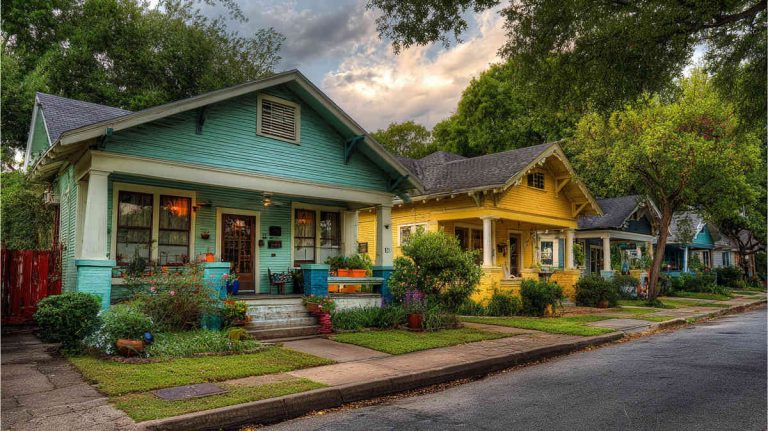You’re eyeing Fort Worth. Maybe you already spend weekends cruising I-30 and whispering, That porch is mine. Maybe the city’s laid-back confidence just fits. Either way, the clock matters. Buy at the wrong moment and you’ll pay extra or fight ten other offers. Time it right and you waltz into closing with money left for brisket.
The truth: there’s no single magic month. Yet patterns, micro-seasons, and a few local quirks line up like cattle in the Stockyards. Learn them and you’ll spot your opening.
Ready? Let’s move.
Feeling Out the Fort Worth Rhythm
Fort Worth doesn’t mimic the national cycle. Aerospace expansions, energy jobs, TCU enrollment, even rodeo season nudge the housing tempo. Below is what actually happens on the ground—pulled from MLS stats, title company chatter, and more than a few front-porch stories.
Spring: Bluebonnets and Bidding Wars
Inventory pops as soon as baseball fans start tailgating at Globe Life Field. From late March through May, fresh listings jump 25-35 percent compared with winter. Sellers love showing a home when the yard is green and the daylight lasts past dinner.
The upside for you: choice. One week you’ll tour a 1960s ranch in Ridglea, the next a new build in Walsh. If you’re picky about floorplans or want that rare oversized lot, spring is hunting season.
The catch arrives fast. Competition spikes. Average days on market in April sits in the high teens. Multiple-offer showdowns become normal by Easter. Escalation clauses, appraisal gap coverage, quick-close promises—the whole arsenal comes out.
What the numbers whispered: in the past three springs, sale prices in Tarrant County averaged 101-to-103 percent of list. That tiny three-percent sliver sounds harmless until you realize it can equal twenty grand on a mid-tier house.
Pro tip if you still love spring:
- Dial in your financing before the first tour. Pre-approval letters stamped with a local loan officer’s name carry weight.
- Schedule weekday showings. Weekend traffic triples the crowd.
- Offer flexibility on the closing date. One seller we met knocked off five grand for a buyer who let them stay an extra three weeks and avoid a short-term rental.
Summer: Sun-Baked Prices, Longer Showing Hours
June through August brings heat, humidity, and folks with moving trucks idling at dawn to beat the 100-degree afternoon. The volume of listings stays high, yet demand finally plateaus. Think of it as a pause between spring adrenaline and fall bargains.
Why the short breather? People tied to the school calendar are already under contract. Corporate relocations often wait until Q4 budget meetings. And let’s be honest: nobody likes open-house hopping when the heat index hits 110.
The result is sneaky good. Median prices in July still nudge up, but the gap between list and sale narrows. Last July, 46 percent of Fort Worth homes closed at list price, not above. You may score a modest concession on closing costs or get the seller to throw in the fridge. Small wins stack up.
Another quirk: long daylight hours expand showing windows. You can squeeze in three tours after work instead of burning precious PTO. That extra access levels the playing field for nine-to-fivers who lost houses in frantic spring lunchtime showings.
Things to watch:
- Heat fatigue is real. Walk a property at noon. If the attic is an oven and the HVAC groans, factor replacement costs into your offer.
- Landscaping hides little. Crisp grass in July hints at a robust sprinkler system. An emerald lawn when everyone else’s yard is toasted? Might mean a leak or an insane water bill. Ask.
- Fourth of July fireworks around Lake Worth: fun, but noise-sensitive buyers should test the neighborhood at night.
Autumn: Pumpkin Spice and Price Drops
Early September arrives. Football crowds roar at AT&T Stadium. Sellers who overshot in spring still sit on the market. Cue opportunity.
Data first: the median price in Fort Worth dips 2-to-4 percent from August to November. Days on market climb into the mid-20s. Nothing drastic, but enough to tilt leverage your way.
Why the shift?
- Fatigue. Sellers who listed high finally agree to reality.
- Corporate relocations ramp up. Employers paying closing costs for transferees prefer quick, clean deals.
- Tax timing. Closing before December 31 lets sellers capitalize on that year’s homestead exemption or avoid next year’s property tax increase.
Negotiation power grows. In the past two autumns, 38 percent of buyers snagged either a price cut, a repair allowance, or both. One client I watched last fall grabbed a $12k roof credit because the seller simply wanted the file off their desk before Thanksgiving. Easy win.
Yet inventory is narrowing. You’ll see fewer fresh listings after Halloween. If you need very specific features—a short commute to Lockheed, a detached workshop—you might wait another cycle.
Winter: Cold Front, Warm Deals
January is weird here. One day it’s 70 and sunny; the next an ice storm closes I-20. That weather whiplash keeps casual shoppers home. Result: the quietest, most negotiable window of the year.
Numbers tell it best. Over the last three winters:
- Active listings dipped below 2,200 city-wide, half of spring inventory.
- Average sale-to-list ratio fell under 98 percent.
- Nearly half the contracts came with seller-paid closing costs.
Sellers in winter often list for one of three reasons:
- Job transfer with a set start date.
- End-of-year investor liquidation.
- Life stuff gone sideways.
All three crave speed. Use it. Offer a shorter option period, a reasonable but decisive closing timeline, and you may shave thousands off the price.
The downsides are obvious. Fewer homes fit your wishlist. Exterior inspections battle cold rain. And movers book up around the holidays.
Still want those winter bargains? Bring a flashlight to late-afternoon showings. Sunset at 5:30 hides defects. Hire an inspector comfortable crawling a chilly crawlspace. And never skip the roof check just because an ice dusting looks pretty.
Beyond Seasons: Five Local Factors Most Guides Skip
- Property Tax Protest Calendar
Fort Worth property taxes bite. The appraisal district mails notices each spring. Sellers who protest successfully often market right after, flaunting a lower tax bill. That’s mid-May through June. Watch for it.
- Rodeo & Stock Show Effect
The Fort Worth Stock Show & Rodeo runs January into early February. Tourism spikes. Short-term rental owners sometimes unload properties before or right after the event, depending on profits. Investors, scour listings downtown and in West 7th right after the last bull is loaded.
- Major Employer Announcements
Aerospace contracts awarded at the Joint Reserve Base, distribution hubs along I-35W—these deals create hiring waves. The six-month window before onboarding sees relocation buyers arrive. Predict it, and you can shop before demand jumps.
- New-Construction Release Schedules
Master-planned communities west of Loop 820 drop speculative inventory in quarterly batches. Call the on-site sales rep, ask about fiscal-year ends. Builders tied to publicly traded companies discount heavily in September and December to hit volume targets.
- Homestead Exemption Deadline
Buyers must occupy by January 1 to file a homestead that year. Close in December and you secure the exemption almost immediately. For some, that deadline is worth accepting a tighter holiday move.
Personal Readiness Beats Perfect Timing
Take every chart, every data bit, then zoom in on your life:
- Job stability. If your income could jump or drop in six months, plan around that, not around bluebonnet season.
- Cash cushion. Down payment plus emergency fund. Houses in Fort Worth laugh at owners who skip the safety fund.
- Interest-rate lock. When rates zigzag, a half-point swing moves a $450k mortgage payment by roughly $150 monthly. Sometimes grabbing a good rate in a mediocre season beats chasing a cheaper list price later.
- Rent situation. Month-to-month lease gives you freedom. Fixed lease penalty? Maybe wait.
Micro Checklist Before You Pull the Trigger
- Get clear on neighborhoods. Fort Worth eats miles. A Keller office worker commuting from Benbrook learns regret fast.
- Line up your team. Agent, lender, inspector, insurance broker. Have backups.
- Sketch your exit plan. Five-year hold? Ten? Rental potential later? Knowing how you might leave a house shapes what you’ll pay for it now.
- Sneak peek at insurance. Rates jumped after recent hail years. Call carriers, quote the address before you write an offer.
- Keep an eye on infrastructure. The Panther Island project and TEXRail extensions will reshape values along the Trinity River corridor. Early adopters win.
Putting It All Together
So, what is the best time to buy a house in Fort Worth? Here’s the distilled local wisdom:
- You crave selection and don’t mind fighting: late March through early June.
- You want reasonable prices and daylight for showings: July.
- You like negotiating room and can decide fast: September into mid-November.
- You’re hunting bargains and have patience for thin inventory: January.
That said, the right time is when your own finances, lifestyle, and gut line up. The market rewards decisiveness more than timing perfection.
Ready To Make Your Move?
Pull up current listings tonight. Highlight three that fit. Book showings this week. If you’re holding out for some mystical “absolute best” moment, you’ll still be scrolling next year while prices edge up.
Fort Worth doesn’t wait. Neither should you.





